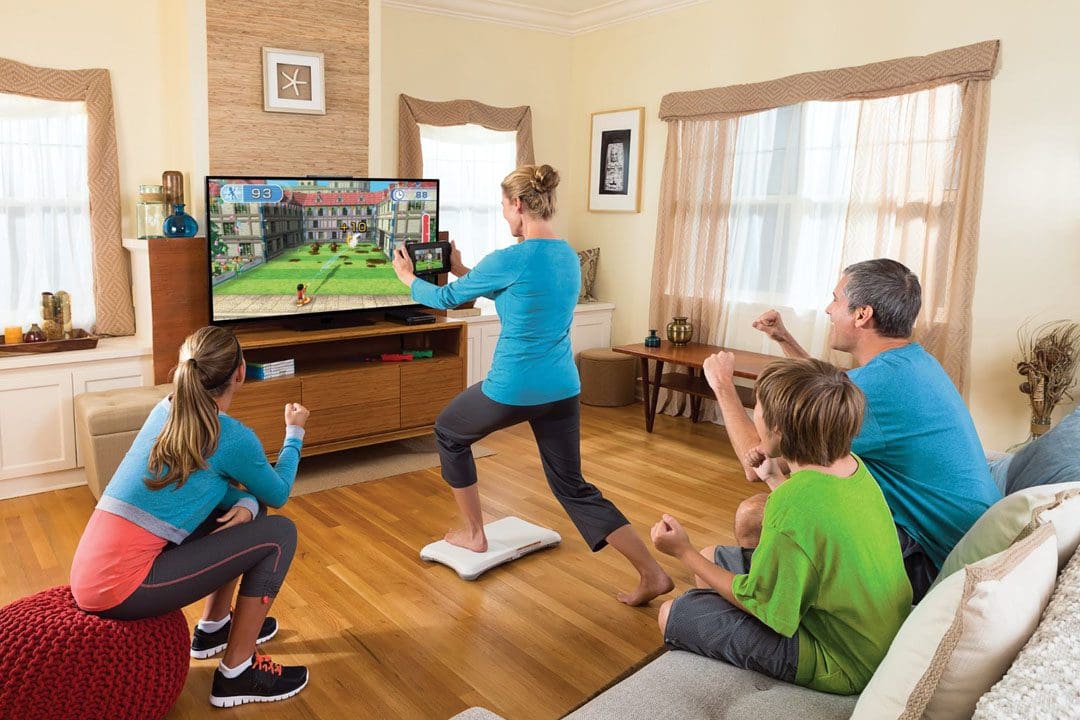This time of year brings plenty of changes to normal day-to-day activities. We eat more and move less. But it is possible to stay on track while still enjoying the holiday festivities. The key is to balance healthy choices, stay aware of stressors, make a plan for staying healthy and get the whole family involved. The CDC recommends focusing on four areas to maintain family health: physical activity, nutritional habits, sleep, and screen time.
 Family Health
Family Health
Striking a balance between being active and having fun will help to create a more enjoyable and relaxing holiday experience.
Get The Whole Family Moving
- Physical activity develops stronger muscles and bones, improves heart health, increases blood circulation, and lowers body fat.
- Children ages 3 to 5 years should be active throughout the day.
- Children ages 6 to 17 need at least 60 minutes of physical activity daily.
- Look for ways to blend fun and physical activity as a family.
- If you can get outside, play games like basketball or touch football, walk the dog, or take a nature walk.
- Inside, have a family dance party, play video games that require movement, and encourage everyone to move around and stretch out.
Nutrition
Everyone has go-to foods, treats, and drinks they enjoy during the holidays. Restricting or avoiding these pleasures completely isn’t good, as it can lead to binge eating.
- Eat mindfully and in moderation.
- Making healthy eating a family effort helps everyone reach and keep a healthy weight and sets a healthy example.
- Eat a variety of vegetables and fruits, whole grains, lean proteins, and low-fat and fat-free dairy products.
- Check labels and follow nutrition guidelines.
- Drink plenty of water and real fruit juices instead of sugary drinks.
Maintain Healthy Sleep
- Sleep is essential for optimal brain and body health.
- Healthy sleep helps prevent Type 2 diabetes, injuries, and weight gain.
- Improves mood, concentration, and performance.
- Individuals tend to eat more and be less active when not getting enough sleep.
- Children 6 years old to 12 need between 9 and 12 hours of sleep a night.
- Teens need 8 to 10 hours.
Limit screen time
- Sedentary activities combined with too much screen time can lead to weight gain, sleep problems, and affected mental health.
- Limiting phone, computer, and TV usage maintains mind and body health and generates more time for family activities.
- Turn off electronic devices an hour before bed.
Modeling healthy behaviors and making small lifestyle changes can lead to lifelong healthy habits.
Chiropractic Functional Medicine
Chiropractic functional medicine can improve the body’s neuromusculoskeletal system and enhance overall health. Chiropractic and massage therapies:
- Increase circulation
- Facilitate detoxification
- Balance the distribution of hormones and nutrients
- Regulate the heart’s rhythm
- Soothe the nervous system
- Increase mobility
- Decreased pain
- Increase flexibility
- Serve as a supportive treatment to other kinds of therapeutic care.
Holiday Games
References
Physical Activity Facts https://www.cdc.gov/healthyschools/physicalactivity/facts.htm
Preventing Childhood Obesity: 4 Things Families Can Do, https://www.cdc.gov/nccdphp/dnpao/features/childhood-obesity/index.html
Screen Time vs. Lean Time Infographic, https://www.cdc.gov/nccdphp/dnpao/multimedia/infographics/getmoving.html
Tips to Help Children Maintain a Healthy Weight, https://www.cdc.gov/healthyweight/children/index.html
Post Disclaimer
Professional Scope of Practice *
The information herein on "Family Health: Chiropractic Scientists" is not intended to replace a one-on-one relationship with a qualified health care professional or licensed physician and is not medical advice. We encourage you to make healthcare decisions based on your research and partnership with a qualified healthcare professional.
Blog Information & Scope Discussions
Welcome to El Paso's Premier Wellness, Personal Injury Care Clinic & Wellness Blog, where Dr. Alex Jimenez, DC, FNP-C, a Multi-State board-certified Family Practice Nurse Practitioner (FNP-BC) and Chiropractor (DC), presents insights on how our multidisciplinary team is dedicated to holistic healing and personalized care. Our practice aligns with evidence-based treatment protocols inspired by integrative medicine principles, similar to those on this site and our family practice-based chiromed.com site, and focuses on restoring health naturally for patients of all ages.
Our areas of multidisciplinary practice include Wellness & Nutrition, Chronic Pain, Personal Injury, Auto Accident Care, Work Injuries, Back Injury, Low Back Pain, Neck Pain, Migraine Headaches, Sports Injuries, Severe Sciatica, Scoliosis, Complex Herniated Discs, Fibromyalgia, Chronic Pain, Complex Injuries, Stress Management, Functional Medicine Treatments, and in-scope care protocols.
Our information scope is multidisciplinary, focusing on musculoskeletal and physical medicine, wellness, contributing etiological viscerosomatic disturbances within clinical presentations, associated somato-visceral reflex clinical dynamics, subluxation complexes, sensitive health issues, and functional medicine articles, topics, and discussions.
We provide and present clinical collaboration with specialists from various disciplines. Each specialist is governed by their professional scope of practice and their jurisdiction of licensure. We use functional health & wellness protocols to treat and support care for musculoskeletal injuries or disorders.
Our videos, posts, topics, and insights address clinical matters and issues that are directly or indirectly related to our clinical scope of practice.
Our office has made a reasonable effort to provide supportive citations and has identified relevant research studies that support our posts. We provide copies of supporting research studies upon request to regulatory boards and the public.
We understand that we cover matters that require an additional explanation of how they may assist in a particular care plan or treatment protocol; therefore, to discuss the subject matter above further, please feel free to ask Dr. Alex Jimenez, DC, APRN, FNP-BC, or contact us at 915-850-0900.
We are here to help you and your family.
Blessings
Dr. Alex Jimenez DC, MSACP, APRN, FNP-BC*, CCST, IFMCP, CFMP, ATN
email: [email protected]
Multidisciplinary Licensing & Board Certifications:
Licensed as a Doctor of Chiropractic (DC) in Texas & New Mexico*
Texas DC License #: TX5807, Verified: TX5807
New Mexico DC License #: NM-DC2182, Verified: NM-DC2182
Multi-State Advanced Practice Registered Nurse (APRN*) in Texas & Multi-States
Multi-state Compact APRN License by Endorsement (42 States)
Texas APRN License #: 1191402, Verified: 1191402 *
Florida APRN License #: 11043890, Verified: APRN11043890 *
Colorado License #: C-APN.0105610-C-NP, Verified: C-APN.0105610-C-NP
New York License #: N25929, Verified N25929
License Verification Link: Nursys License Verifier
* Prescriptive Authority Authorized
ANCC FNP-BC: Board Certified Nurse Practitioner*
Compact Status: Multi-State License: Authorized to Practice in 40 States*
Graduate with Honors: ICHS: MSN-FNP (Family Nurse Practitioner Program)
Degree Granted. Master's in Family Practice MSN Diploma (Cum Laude)
Dr. Alex Jimenez, DC, APRN, FNP-BC*, CFMP, IFMCP, ATN, CCST
My Digital Business Card
Licenses and Board Certifications:
DC: Doctor of Chiropractic
APRNP: Advanced Practice Registered Nurse
FNP-BC: Family Practice Specialization (Multi-State Board Certified)
RN: Registered Nurse (Multi-State Compact License)
CFMP: Certified Functional Medicine Provider
MSN-FNP: Master of Science in Family Practice Medicine
MSACP: Master of Science in Advanced Clinical Practice
IFMCP: Institute of Functional Medicine
CCST: Certified Chiropractic Spinal Trauma
ATN: Advanced Translational Neutrogenomics
Memberships & Associations:
TCA: Texas Chiropractic Association: Member ID: 104311
AANP: American Association of Nurse Practitioners: Member ID: 2198960
ANA: American Nurse Association: Member ID: 06458222 (District TX01)
TNA: Texas Nurse Association: Member ID: 06458222
NPI: 1205907805
| Primary Taxonomy | Selected Taxonomy | State | License Number |
|---|---|---|---|
| No | 111N00000X - Chiropractor | NM | DC2182 |
| Yes | 111N00000X - Chiropractor | TX | DC5807 |
| Yes | 363LF0000X - Nurse Practitioner - Family | TX | 1191402 |
| Yes | 363LF0000X - Nurse Practitioner - Family | FL | 11043890 |
| Yes | 363LF0000X - Nurse Practitioner - Family | CO | C-APN.0105610-C-NP |
| Yes | 363LF0000X - Nurse Practitioner - Family | NY | N25929 |
Dr. Alex Jimenez, DC, APRN, FNP-BC*, CFMP, IFMCP, ATN, CCST
My Digital Business Card





 Again, We Welcome You.
Again, We Welcome You.
Comments are closed.